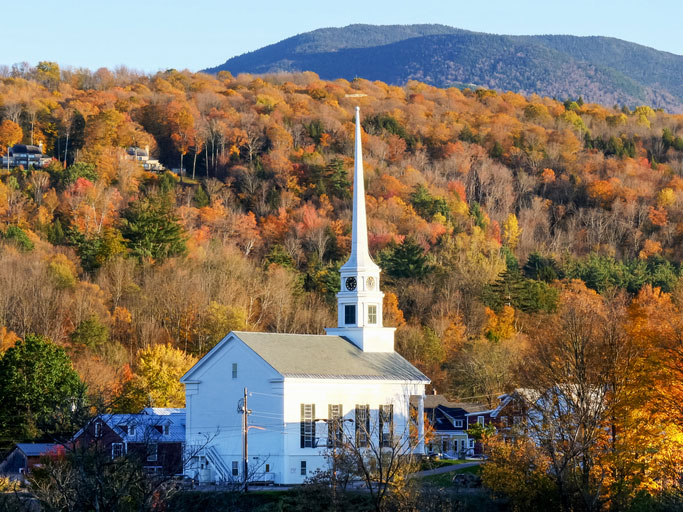
In recent years, Vermont has earned the dubious distinction of being one of the least religious states in the country. According to the Pew Research Center, just 54% of all adults in Vermont identify as Christians. Of those, about 30% are Protestant and 22% are Catholic.
 For those who know Vermont history, these stats are puzzling. After all, Vermont was where some of the country’s most noteworthy religious movements were born. During the early 1800s, religion was a way of life in Vermont, and by the 1830s, thanks to the birth of a number of religious revivals in the state (later referred to as the Second Great Awakening), about 80% of all Vermonters regularly attended church services.
For those who know Vermont history, these stats are puzzling. After all, Vermont was where some of the country’s most noteworthy religious movements were born. During the early 1800s, religion was a way of life in Vermont, and by the 1830s, thanks to the birth of a number of religious revivals in the state (later referred to as the Second Great Awakening), about 80% of all Vermonters regularly attended church services.
John Humphrey Noyes, William Miller, and Mormon prophet Joseph Smith spearheaded much of the religious fervor in Vermont during this time which, by all accounts, forever changed the landscape of religion in the United States.
Explore a Christian Ministry Degree – Request More Info Today!
While the slow decline in Christianity in Vermont since these times is disheartening, it has created a unique opportunity for those with a personal calling to preach the Word of God and spread the Good News of Jesus Christ.
In fact, what Vermont needs now is a new generation of Christ’s disciples who can guide the followers of Christ and inspire others to explore Christianity, welcome it into their lives, and live it daily.
If a career in ministry, missionary work, or Christian outreach is part of your personal calling, you’ll be inspired to build a career in Vermont. But first you’ll need the educational foundation that will make you a competent and capable Christian leader.
Here are the steps you’ll want to take to learn how to become a pastor in Vermont and begin a life-changing career in the church:
Steps to Become a Pastor in Vermont
Step 1. Earn a Bachelor's Degree in Christian Ministry, Pastoral Studies or Other Similar Major in Vermont
A bachelor's degree in an area like Christian studies, pastoral ministries, Christian ministries, or religious studies serves as the ideal foundation on which to build a career in ministry, missionary work, or outreach. It also prepares students to pursue graduate study through a Master of Divinity (MDiv) or similar advanced degree.
Through a four-year Christian undergraduate degree, you'll study Scripture, biblical history, theology, and apologetics, along with courses focused on the practical aspects of ministry.
You'll also complete courses in areas like communications, psychology, and business, all of which are designed to help you become a well-rounded graduate and competent church leader.
Step 2. Look for Ministry Jobs and Gain Experience Serving the People and Churches of Vermont
With an undergraduate degree program in an area like Christian studies or religious studies, you'll be well-positioned to assume important positions in ministry and outreach. From performing missionary work across the country or around the world to working with Christian outreach programs focused on important issues like homelessness and hunger, there's no shortage of opportunities to put your Christian bachelor's degree to good use in Vermont.
For example, the North Carolina-based Baptists on Mission has a New England partnership in Vermont that seeks to continue the program's mission of “every Christian sharing God's love with hurting people through word and deed” through missions and ministries. Some of the program's 19 missions include disaster recovery, family foundations, medical missions, prayer support, and church renewal.
Explore Ministry Jobs with One of Vermont's Many Churches
Your search for exciting professional opportunities should begin with some of the larger churches in Vermont, which are usually home to extensive ministries and outreach programs. From youth deacon to church administrator, you're sure to find exciting opportunities to get a start in the church and start doing good.
Just some of the larger churches operating in Vermont where you're sure to find church and ministry jobs include:
- Calvary Bible Church, Rutland
- Cambridge Christian Fellowship
- Covenant Orthodox Presbyterian Church, Barre
- Crossroads Christian Church, Montpelier
- Living Water Assembly of God, Brandon
- New Life Ministries at First Baptist Church, Fair Haven
- Newport Baptist Church
- Websterville Baptist Church, Graniteville
Step 3. Earn a Master of Divinity (MDiv) or Similar Graduate Degree in Vermont and Establish Your Role in Christian Leadership
If your career goals include becoming an ordained pastor or other senior-level church leader, then you're probably considering pursuing a degree at the graduate level. The Master of Divinity (MDiv) or a similar degree like a Master of Theology or an MA in Ministry has become a popular step to take among those with dreams of becoming a pastor.
The MDiv and similar degree programs prepare students to learn how to become a pastor by providing them with theological and practical training that is informed by a Christian worldview.
Some of the areas of study found within a graduate ministry degree include Old and New Testament interpretation, biblical languages, principles of pastoral care, and social trends and ethical issues in Christianity and in the church. Many of these programs offer a number of specialization or elective options that allow students to personalize their ministry degree to best meet their interests and ministry goals. Popular options often include church planting, theology, biblical languages, and spiritual formation.
Many are also offered as partially or fully online programs as to allow students to earn their online ministry graduate degree while still working with the church and meeting their professional obligations. Online graduate degrees like the online Master of Divinity feature the same robust coursework as traditional, on-campus degrees, yet offer the convenience and flexibility that today's students demand.
Salary Expectations for Pastor Jobs in Vermont
According to the Bureau of Labor Statistics, clergy members in the U.S. (Vermont stats were unavailable) earned an average salary of $56,560 as of May 2020, while those at the top end of the pay scale (top 10%) earned salaries that exceeded $89,510.
Directors of religious activities and education earned an average salary of $52,660 during this time, while those serving in these senior-level positions in larger church organizations earned salaries that more closely reflected the top 10%, which was $93,990.
Step 4. Consider Forming a Christian Ministry of Your Own in Vermont
For many, planting their own church is the pinnacle of a career in ministry. It's a truly rewarding experience that allows pastors and other religious workers to meet a need in the Christian community while bringing more people to Christ. With your hard work, determination, and unwavering faith in the Lord, you can become a church cultivator who grows in evangelism and discipleship.
But before you can realize your dream of planting a church of your own, you'll need to make sure you are establishing your church according to state and federal regulations.
In Vermont, this means registering your church as a nonprofit organization through the Vermont Secretary of State, which includes:
- Choosing at least three members for your Board of Directors
- Choosing a name for your church
- Preparing Articles of Incorporation for your church
- Filing a Certificate of Incorporation
At the federal level, you’ll first obtain a Federal Employer Identification Number (FEIN) from the Internal Revenue Service (IRS), which you’ll use to open bank accounts, receive donations, and apply for a tax-exempt status. You’ll then register your church at the federal level as a 501(c)(3) nonprofit with the IRS by filing a Form 1023 federal tax exemption application.
2020 US Bureau of Labor Statistics salary figures and job market trends for Religious Workers, Church Directors, and Clergy based on state data, not school-specific information. Conditions in your area may vary. Data accessed January 2022.









